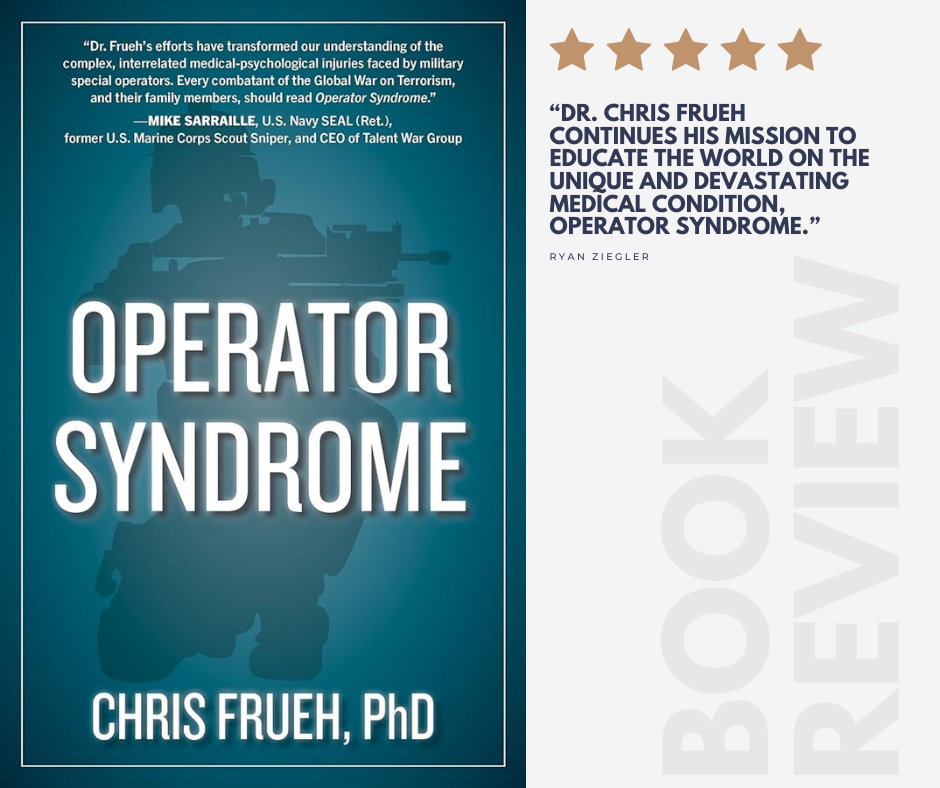Our board member, Ryan Ziegler, wrote an informative review of Dr. Chris Frueh’s new book, Operator Syndrome. Ryan is a Physician Assistant and a Green Beret. He has led US and foreign troops in combat, and has run successful start-up businesses. His leadership experience in both the military and civilian sectors is a great addition to the SOAA team. Ryan has dealt with and understands many of the issues members of our community often face and his experience will help us to continue to push the issues that matter most.
Dr. Chris Frueh continues his mission to educate the world on the unique and devastating medical condition, Operator Syndrome. As a former Green Beret who has dealt with many of the elements of Operator Syndrome described in this book, I was impressed by how well he captured the wide range of issues common to Special Operations Forces (SOF) Veterans. Born into a military family, Dr. Frueh has spent most of his career treating Veterans, though he never wore the uniform himself. This makes the accomplishment of this book even more impressive, as he accurately depicts the symptoms and issues that I, and so many like me, have faced.
The book begins with a fictitious patient who presents to a physician with many complaints common to SOF Veterans. The theoretical patient is treated like I was, and many I know, with standard medical practices. Then, an alternative approach to assessing and treating this patient is presented. This flows throughout the rest of the book, giving the reader an insightful look at the complex and interconnected nature of patients with Operator Syndrome.
It is important to note that Operator Syndrome is not a recognized diagnosis and is still in the infancy stages of research—just as PTSD was studied throughout the 1970s and finally recognized and added to DSM-III in 1980. Readers of all levels will better understand how different aspects of health are interconnected and play into each other. The book also raises awareness for physicians and medical practitioners about the labs and specialties involved in assessing and treating SOF Veterans. Family, friends, and Operators alike will gain insight into the condition’s many nuances and will be given recommendations on how to deal with each issue.
When I returned home from Afghanistan, my life started to fall apart. I tried physical therapy for the pain and injuries. I later sought mental health counseling from multiple sources, including the VA and various non-profits. I went on retreats with other Veterans and was blessed with the opportunity to go to Montana to learn to flyfish with my wife in one of the most beautiful places in the world. However, these various treatments occurred in a vacuum and lacked cohesion and integration.
Dr. Frueh points out the importance of a team-based approach to treatment that is not sporadic or asynchronous, but immersive. I can speak from personal experience that my medical conditions finally started to improve when I accidentally stumbled into a more comprehensive, integrated healthcare scenario. For so long, I had been going to physical therapy and working with a psychologist with little response to treatment. Finally, a friend recommended that I see a Traumatic Brain Injury (TBI) and Endocrine Specialist. Once I started those treatments, my body began to heal, the pain dissolved, and I started to feel positive emotions again.
In this book, you will find a comprehensive list of conditions and symptoms broken down into chapters, allowing readers to gain awareness and digest information easily. I have no doubt Operator Syndrome will empower patients to have informed discussions with their providers, as well as arm providers with the knowledge and awareness required to treat their patients with a whole-person approach. My hope is that it encourages further research beyond Dr. Frueh’s peer-reviewed journal article, “Operator Syndrome”: A unique constellation of medical and behavioral health-care needs of military special operation forces. Upon finishing the book, I was left with these questions, “This isn’t already a thing?” “In today’s world of technology and advanced medicine, our medical system continues to work in silos?” “How are we not doing this already for our US Servicemembers?” I hope you’ll come away with the same questions and help do your part to spread awareness about Operator Syndrome and what is needed to treat it effectively.





